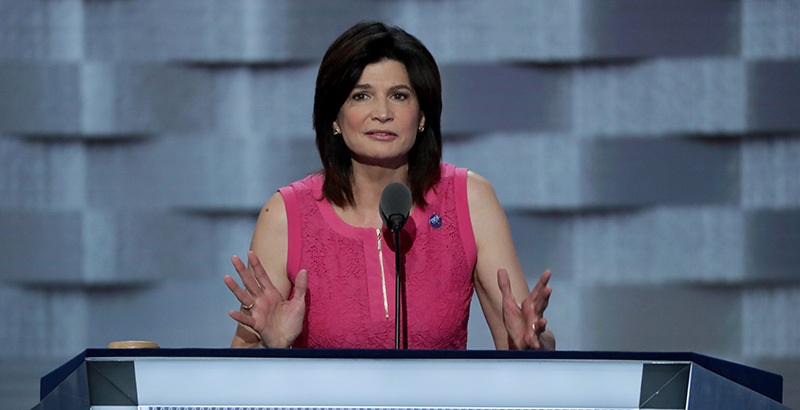Analysis: The National Education Association Cancels Atlanta Assembly, Will Hold Limited Virtual Convention in July

Mike Antonucci’s Union Report appears most Wednesdays; see the full archive.
For the first time in 75 years, delegates to the National Education Association Representative Assembly will not meet to debate and approve the union’s policies. The 170-member NEA board of directors almost unanimously approved a motion April 20 to call off the annual meeting, which was to occur the first week of July in Atlanta.
“We believe that meeting in July would pose a substantial risk to the health and safety of our delegates and the communities to which they would return,” said NEA President Lily Eskelsen García on behalf of the union’s nine-member Executive Committee in a report to the board.
Atlanta’s convention center is currently being used as a hospital for recovering COVID-19 patients.
The union cannot conduct the assembly’s usual business online, as it involves floor debate, motions, amendments and votes by some 6,000 delegates. Instead, the union will hold a virtual convention July 2-3 with an agenda limited to three actions: electing union officers; voting on an endorsement of Joe Biden for president in the November 2020 general election; and approving the union’s budget. All other actions — the legislative program, resolutions, new business items and policy statement amendments — that consume a great part of the four-day assembly will be postponed until 2021.
“Presentations on this limited agenda can be made virtually, with votes taken by mail ballot assuring access to all delegates and in compliance with our rules on secret ballot for NEA elections and the presidential endorsement,” according to the Executive Committee’s recommendation.
Two seats on the committee are up for election this year, as are at-large seats on the board of directors. The NEA Constitution allows for all officers to retain their seats in the event of a postponement of the assembly, but the union has decided to conduct those votes by mail.
An endorsement of Biden in the general election requires the approval of 58 percent of voting delegates and would implicitly authorize the use of both dues and political action committee money on behalf of his campaign.
Approval of the budget is naturally the most important item on the limited agenda. Without it, NEA would technically be limited to continuing the current dues level and expenditures. However, the organization’s constitution does allow the board to act between meetings of the Representative Assembly, so the union might have some wiggle room.
Last year, in a budget-cutting move, NEA eliminated an in-person open hearing on the budget for delegates, instead substituting a virtual presentation. This will happen again in 2020.
“At the virtual RA, delegates would have the opportunity for limited debate and speeches ‘for’ and ‘against’ the budget,” according to the committee report. “There would be no ability to debate amendments, as we have no virtual ability to vote on the floor.”
Such a debate would be pro forma in any case. The budget has never been amended from the floor in the 23 years I have covered the Representative Assembly. The delegates always approve it as presented.
The limited agenda eliminates any chance of a dramatic change in NEA policy. Last year’s assembly led to the establishment of the “community ally” category of membership, restrictions on disaffiliations and an explicit stance on abortion. Any new ideas will have to wait until 2021.
Canceling the meeting in Atlanta has cost implications for both NEA and its state affiliates. NEA budgeted $6.6 million for the convention but expects that it will incur millions in cancellation costs.
“Our affiliates, caucuses and councils who have signed contracts for events, hotels, etc., will likely also incur their own cancellation costs,” reported the Executive Committee.
However, NEA and its affiliates estimate a “combined gross savings” of almost $6 million for not holding the convention in person.
One other consequence of the move will be its effect on the union’s PAC fundraising. The Representative Assembly yields the lion’s share of annual contributions to the NEA Fund for Children and Public Education. Without it, the union will have to find other ways to solicit donations from members.
The American Federation of Teachers is scheduled to hold its biennial convention the last week of July in Houston. As of this writing, it has made no announcement regarding possible postponement or cancellation.
Get stories like these delivered straight to your inbox. Sign up for The 74 Newsletter

;)